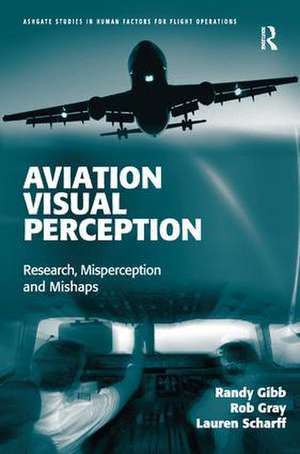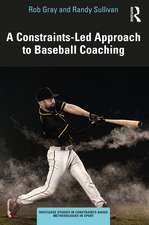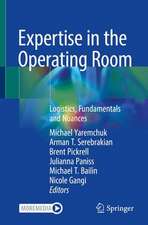Aviation Visual Perception: Research, Misperception and Mishaps: Ashgate Studies in Human Factors for Flight Operations
Autor Randy Gibb, Rob Gray, Lauren Scharffen Limba Engleză Hardback – 28 mar 2010
Preț: 1114.88 lei
Preț vechi: 1359.61 lei
-18% Nou
Puncte Express: 1672
Preț estimativ în valută:
213.40€ • 231.88$ • 179.37£
213.40€ • 231.88$ • 179.37£
Carte tipărită la comandă
Livrare economică 21 aprilie-05 mai
Preluare comenzi: 021 569.72.76
Specificații
ISBN-13: 9780754674979
ISBN-10: 0754674975
Pagini: 312
Dimensiuni: 156 x 234 x 19 mm
Greutate: 0.62 kg
Ediția:1
Editura: CRC Press
Colecția Routledge
Seria Ashgate Studies in Human Factors for Flight Operations
ISBN-10: 0754674975
Pagini: 312
Dimensiuni: 156 x 234 x 19 mm
Greutate: 0.62 kg
Ediția:1
Editura: CRC Press
Colecția Routledge
Seria Ashgate Studies in Human Factors for Flight Operations
Notă biografică
Colonel Randy Gibb has served in the United States Air Force since 1986 after earning his commission and Bachelor of Science degree as a Distinguished Graduate from the United States Air Force Academy. He has flown more than 3,400 hours in the following aircraft: Instructor/Evaluator pilot Northrop T-38 Talon, Instructor/Evaluator pilot Lockheed C-5 Galaxy, Instructor pilot T-3 Firefly, Aircraft Commander Learjet C-21, Instructor/Evaluator pilot Raytheon Beechcraft 400 T-1 Jayhawk, and Instructor T-52 Diamond 40. Colonel Gibb's graduate education includes Master of Science in Engineering, Industrial Engineering - Human Factors, Arizona State University, 1996, Master of Arts in National Security and Strategic Studies, Naval Command and Staff College, Newport RI, 2000, and a PhD in Industrial Engineering - Human Factors, Arizona State University, 2007. Col. Gibb had two flying unit commander positions: he led the 84th Airlift Flight, Peterson AFB, C-21 unit as well as the 99th Flying Training Squadron, Randolph AFB, T-1 unit. He is currently an Assistant Professor and Deputy Department Head, Behavioral Sciences & Leadership Department, United States Air Force Academy teaching classes in human factors, engineering psychology, and introductory psychology. Rob Gray is at the University of Birmingham, UK. He obtained his M.S. and Ph.D. in Experimental Psychology from York University, Canada. After earning his Ph.D. he worked for three years as a Research Scientist with Nissan Research & Development conducting research on driving safety. Since 2002 he has worked as a part-time Research Psychologist with the U.S. Air Force working primarily on flight simulator design. At ASU he directs the Perception & Action Laboratory which investigates visual cues used by pilots for tasks such as landing and low-altitude flight. He has authored 36 journal articles, 17 conference papers, and 7 book chapters. In 2007 he received the American Psychological Association (APA) Distinguished Scientific Award for Early Career Contribution to Psychology and the APA Division 21 Earl Alluisi Award for Early Career Achievement in the Field of Applied Experimental & Engineering Psychology. Lauren Scharff is the Director for the Scholarship of Teaching and Learning and a Professor in the Department of Behavioral Sciences and Leadership at the United States Air Force Academy. Prior to that she was a Professor in the Department of Psychology at Stephen F. Austin State University, where she worked since 1993. She completed her Ph.D. in Human Experimental Psychology (Visual Perception) in December, 1992 from the University of Texas at Austin. She teaches introductory psychology, research methods, biopsychology, and perception courses at the undergraduate and graduate levels, and has won several teaching awards. Her research interests have included depth perception, visual search, text readability, and the human factors of web site design, although her students continually shift her research efforts to new directions. She has also collaborated with researchers at NASA-Ames Research Center to create a metric to predict text readability, including conditions that apply to head-up displays.
Recenzii
'To a pilot, the book issues a clear warning that over-reliance on external visual judgement in degraded visual conditions can be a recipe for disaster.' The Aerospace Professional, April 2011
Cuprins
1: Vision in Aviation; 2: Sensation and Perception Foundations; 3: The Role of Basic Visual Functions in Aviation; 4: Pilot Perspective of Cues Used for Visual Flying; 5: Research on Cues Used for Visual Flying; 6: Spatial Disorientation—Cues, Illusions and Misperceptions; 7: Aviation Mishaps: Misperception of Visual Cues; 8: Aviation's Future: Technological Advancements to Visual Perception
Descriere
This book is the first dedicated to visual perception in aviation. It includes the foundations of visual and vestibular sensation and perception; how visual perceptual abilities are assessed in pilots; the pilot's perspective of visual flying; a summary of relevant human factors research; examples of specific visual and vestibular illusions and misperceptions; mishap analyses; and, finally, how this knowledge is being used to better understand visual perception in aviation's next generation.






























